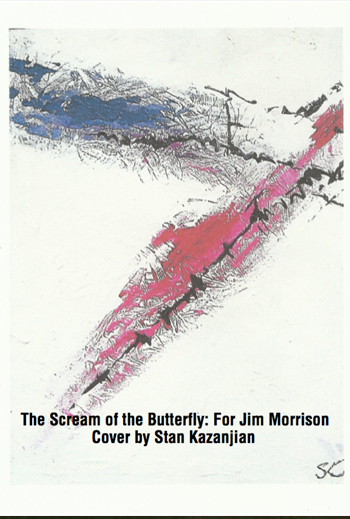 |
Scream of the Butterfly
by Ron Martinetti
An elegy for Jim Morrison by Ron Martinetti, author of The James Dean Story.
American Legends Publishing, 15 pg. $1.00
ORDER ONLINE
|
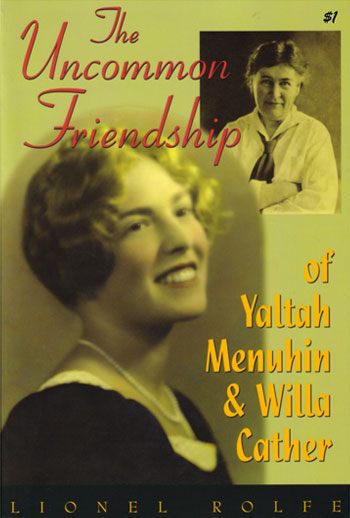 |
The Uncommon Friendship of Yaltah Menuhin & Willa Cather
by Lionel Rolfe
The Menuhins were one of America's great musical families whose close friendship with Willa Cather, the author of Death Comes for the Archbishop and other classics, is now recounted by Lionel Rolfe. The Menuhin siblings included brother Yehudi, the great violinist, and sister Yaltah whom some believed the most talented but whose fear of touring hindered her career. A noted Los Angeles journalist, Rolfe lays bare his mother, Yalth's, close relationship with Willa, along with a family tale of genius and eccentricity, amid the backdrop of London and New York, where the Menuhin's paths intersected with the gifted and strangely reclusive novelist. American Legends Publishing. 164 pg. $1.00
ORDER ONLINE |
 |
Wild Ones: Natalie Jackson & The Usual Suspects
by Jonah Raskin
Neal Cassady was the central figure in the Beat Generation--the hero of On the Road and the Adonis of Denver, as Jack Kerouac called him; and Natalie Jackson was his lady--or one of them anyway. She was a Kerouac character in Dharma Bums, and Natalie's death in a rooftop accident or suicide has long been a mystery. Now Beat scholar Jonah Raskin sheds new light on Natalie Jackson's shadowy life and death in San Francisco of the early 1950s. American Legends Publishing, 30 pg. Illustrations, $1.00
ORDER ONLINE
|
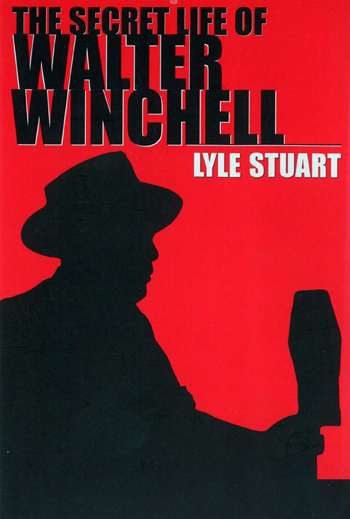 |
The Secret Life of Walter Winchell
by Lyle Stuart
Ours is an evanescent age, and among the vanished are newspaper
columnists who have migrated to the Internet where they blog, often it seems
to an audience of one. Yet, there was a time when newspaper columnists
reached millions and shaped public taste with the tap of a typewriter key.
For a time, the King of Columnists was Walter Winchell (1897-1972) of the
New York Daily Mirror who boasted: "Other columnists may print it--I make
it public." And so he did, in short bursts of tommy gun prose that drew from
the argot of Broadway, the underworld, and the prize ring. "I really gave it
to that bum," Winchell would boast, and it didn't matter if the victim was a
Congressman, movie star, or fellow columnist with whom Walter carried on
one of his legendary feuds. Among those he feuded with was the late
Lyle Stuart--a crusading journalist whose classic 1953 biography
shed light on Winchell's own world of showgirls and backroom favors
(not to mention colossal inaccuracies) and helped lead to the
columnist's downfall. American Legends Publishing, 154 pg. $1.00
ORDER ONLINE
|
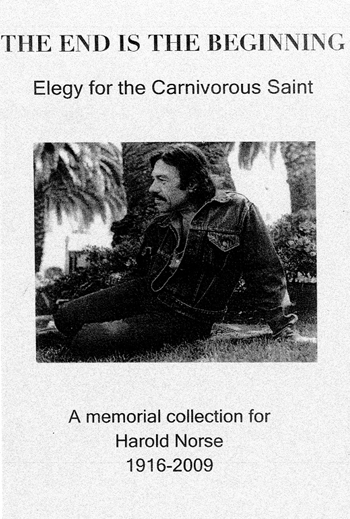 |
The End Is the Beginning: Elegy for the Carnivorous Saint
The 1940s was the slick era of American Lit, typified by The New Yorker and its house critic, Edmund Wilson, who championed writers whose work was polished, Eliotified, and without a comma out of place. Overlooked by mainstream critics was a lively underground of writers and poets whose publishing house was a mimeograph machine and whose platform was the local coffee house. This generation of writers included Paul Goodman, Milt Klonsky, and Harold Norse (1916-2009). Born in Brooklyn, Norse was raised by a single mother who worked in a factory. His early poetry was marked by strong homoerotic themes. In 1953, he left America and lived in Paris where he became associated with William Burroughs and other members of the Beat Movement. After moving to San Francisco in the 1970s, he lived out his life writing poems in the lonely rooming houses of that city. "I want to shed light on what I am," he told editor Todd Swindell, "which is a gay man on the fringes of society." Swindell, a scholar of Norse and Beat writers, has collected poems and other tributes to Norse by Gerard Malanga, Neeli Cherkovski, Ira Cohen, among others. American Legends Publishing, 33 pg. Illustrated, $1.00
ORDER ONLINE |
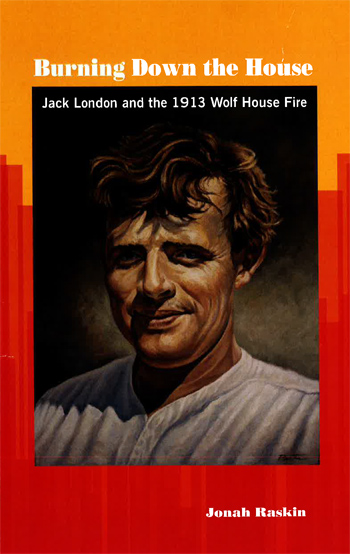 |
Burning Down the House
Jack London and the 1913 Wolf House Fire
by Jonah Raskin
Jack London's life was the template upon which Twentieth Century
novelists would measure themselves: adventurer, war correspondent,
London wrote bestsellers like The Call of the Wild and The Sea-Wolf.
In between, he managed to sail his own ketch to Tahiti and run for
mayor of Oakland (as a socialist). Jonah Raskin has written an
engrossing account of a mysterious fire that gutted the author's
showplace hunting lodge--the Wolf House--whose ruins are
still a tourist attraction in Glen Ellen that draws thousands
every year. The fire left history asking: Who did it?
The author? Reactionary neighbors? Or was it
a tragic accident? Raskin's lively book will appeal to
serious London fans or those who are new to the
legendary author. American Legends Publishing,
28 pg. Illustrations, $1.00
ORDER ONLINE |
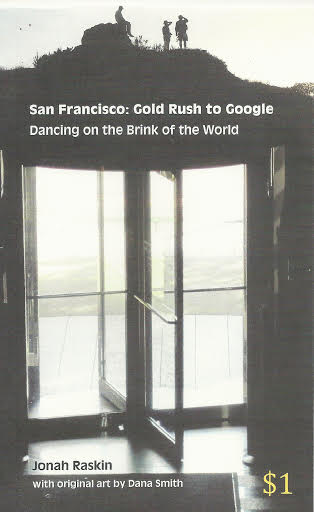 |
San Francisco: Gold Rush to Google
by Jonah Raskin
To some, the Internet is already The God that Failed--and San Francisco, its Paradise Lost.
It is a picturesque realm ruled by Angels (with halos of stock options) and its own purgatory filled with independent contractors, Uber drivers, and ordinary folk that airbnb their mansions on weekends.
Yet, as Professor Jonah Raskin notes in San Francisco: Gold Rush to Google, this is not surprising nor anything new.
The City that welcomed the '49ers now has more venture capitalists that any other metropolis in the world. And if the new technocrats with their laptops and lattes regard the town as their "fraternity house," as writer Rebecca Solnit put it, they must feel at home in the towering glass condos that replaced the back streets and shadowy alleys that moved a cynical Sam Spade to say back in the 1920s: "Most things in San Francisco can be bought, or taken." American Legends Publishing, 21 pg.
Illustrations, $1.00
ORDER ONLINE |
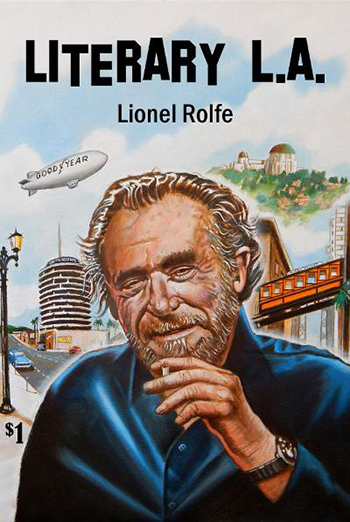 |
Literary L.A.
by Lionel Rolfe
There are few roles more unrequited than that of a Los Angeles intellectual--
ignored, on the one hand, by The New York Review of (Each Other's) Books and shunned, on the other, by the high-priced screenwriters of Malibu. Such
was the plight of the late Lionel Rolfe. An early columnist for The Los Angeles
Free Press, he was fascinated by the hold his city had on writers, and in Literary L.A. wrote about many of them from Aldous Huxley and his
apocalyptic visions in the Mojave Desert to Charles Bukowski and his
paradise of red vinyl booths and barroom pool tables. Rolfe also tracked
down and interviewed those who knew Bertolt Brecht and other political
exiles who lived in relative comfort during World War II, thanks to studio
work. Now re-issued by American Legends, Rolfe's book deserves
permanent recognition as a lively and informative look at writers--
including Henry Miller, Dorothy Parker, Nathanael West--who
made their home--sometimes temporarily--in the City of Angels.
American Legends Publishing, 223 pg. Illustrations, $1.00
ORDER ONLINE |
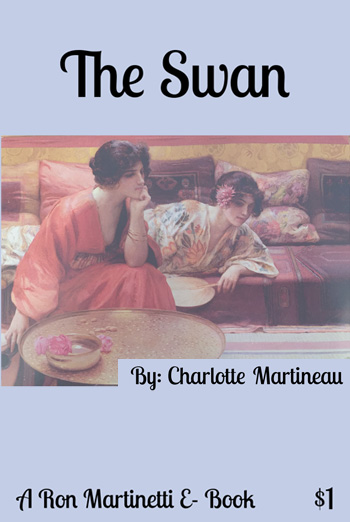 |
The Swan
by Charlotte Martineau
It has been over a half-century since the late Tom Wolfe
declared the novel dead, but American fiction has limped
along, propped up by the gimmickry of "Post Modern"
writing (footnotes and all). American Legends is now
proud to introduce a story in the social realism tradition
of Kate Chopin and Theodore Dreiser. Set on a Southern
campus, this sensuous tale involves the meeting of an aristocratic
graduate student and her brilliant rival whose disdain
is swept away by her new friend's icy beauty. An American
Legends digilet, 8 pg. $1.00
ORDER ONLINE |









